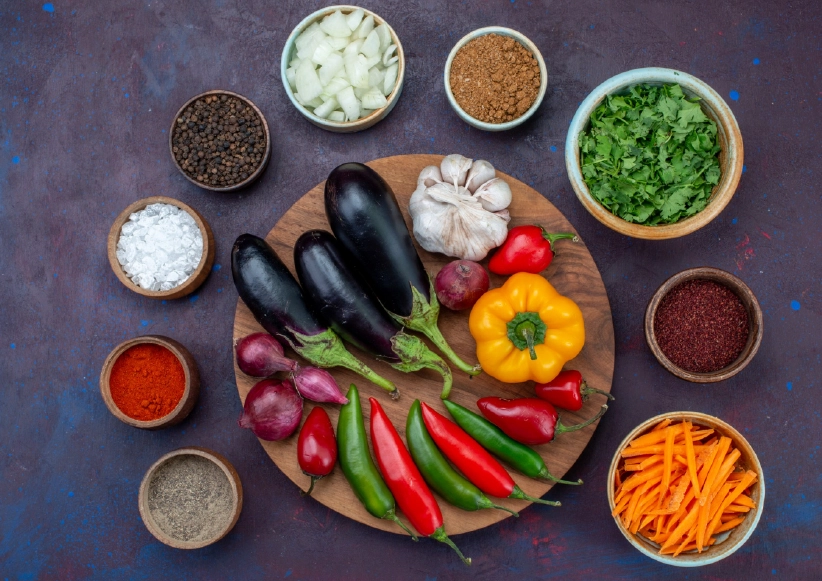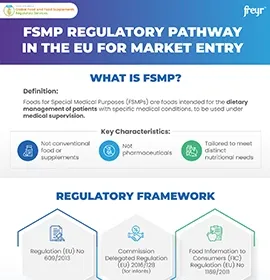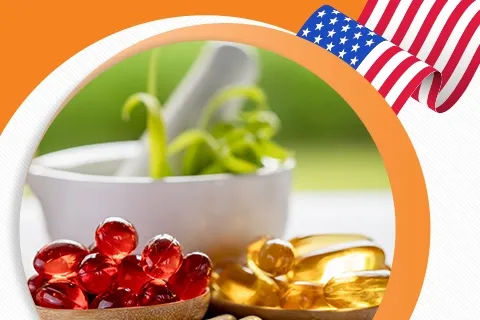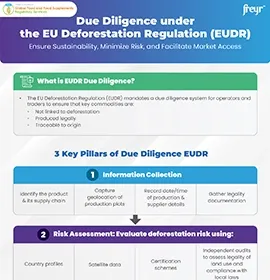Novel Food Compliance – Navigate Global Regulatory Pathways with Confidence
The food and dietary supplement landscape is rapidly evolving with the emergence of novel ingredients, innovative food technologies, and functional products. Understanding and complying with novel food regulations is crucial for companies looking to market these products globally. Freyr offers comprehensive Regulatory support for novel food classification, safety assessments, and global compliance, including:


New Dietary Ingredient Notification (NDIN)

Generally Recognized as Safe (GRAS) Notification

NSF Regulatory Compliance for India

Food Additive Petition (FAP) Filing
Our services help ensure that your novel foods or ingredients meet all safety, efficacy, and regulatory requirements across key markets, such as the U.S., EU, Australia, India, Singapore, and more.

What Is a Novel Food or Ingredient?
A novel food or New Dietary Ingredient (NDI) is defined as any substance that was not significantly used in the human diet before a specified reference date — for instance, October 15, 1994, in the U.S. Novel ingredients may include:
- Foods or ingredients with new molecular structures
- Substances derived from plants, animals, microorganisms, or minerals not commonly consumed
- Engineered nanomaterials or ingredients processed using new technology
- Microorganisms, fungi, or algae
- Ingredients resulting from new production processes that significantly alter nutritional or safety characteristics
* Each country maintains unique definitions, cut-off dates, and requirements for novel food classification.
Freyr’s Novel Food Regulatory Services
1. NDIN (New Dietary Ingredient Notification)
A New Dietary Ingredient (NDI) is a dietary ingredient not marketed in the U.S. as a dietary supplement before October 15, 1994. When a dietary supplement contains an NDI:
- Manufacturers or distributors must submit a New Dietary Ingredient Notification (NDIN) to the FDA at least 75 days before marketing the product
- They must also provide evidence that the ingredient is reasonably expected to be safe under the recommended or suggested conditions of use on the label.

2. GRAS (Generally Recognized as Safe)
The GRAS process is a voluntary submission to the U.S. FDA where the manufacturer notifies the agency that a substance is considered GRAS for its intended use. Key points include:
- GRAS status demonstrates safety in conventional foods without requiring premarket FDA approval
- GRAS status is supported by expert consensus through scientific procedures or a history of safe use before 1958
- It can be approved via
- Self-Affirmed GRAS Process
- GRAS Notification to FDA
3. NSF Regulatory Support (FSSAI Non-Specified Foods)
India's FSSAI Non-Specified Food and Food Ingredients Regulations (2017) cover novel or innovative food items that do not fall under standard food categories. Key highlights:
- Applicable to novel foods, new food additives, enzymes, and imported foods not traditionally consumed in India
- Food Business Operators (FBOs) must apply for approval before manufacture, import, or sale
- The process includes submission through FSSAI's ePAAS portal, detailed documentation, and application fee
- FSSAI performs scientific risk assessment and issues a decision (approval or rejection)
- Post-approval obligations include updating licenses and traceability compliance
4. Food Additive Petition (FAP) Filing
When a substance is not GRAS and is intended for use in conventional food, a Food Additive Petition (FAP) is required:
- Purpose: To seek FDA approval for a new food additive or a new use of an existing one
- Submitted By: Manufacturer, distributor, or interested party
- Legal Basis: Section 409 of the Federal Food, Drug, and Cosmetic Act (FD&C Act)

What Does an FAP Include?
- Chemical identity and composition of the additive
- Manufacturing process
- Proposed uses and levels of use in food
- Toxicological and safety data
- Environmental assessment or claim for categorical exclusion
- Labeling information (if required)
How Freyr can Help
- Preliminary feasibility assessment to determine suitability as a novel food/novel ingredient/ NDI/GRAS/NSF
- Proven success with NDIN, GRAS, NSF, and FAP submissions
- Novel food ingredient review – complete data review.
- Review of documents per the respective Health Authorities (HAs) guidelines for submission/notification.
- Application submission for novel food ingredient registration.
- Communication and follow-up with HAs.


Why Choose Freyr?
- A qualified team of experts with hands-on experience in novel food and ingredient registration.
- Expertise in online submission and strong local support expertise in novel food and ingredient registration.
- Novel food ingredient registration/identification and Regulatory consulting on the registration process.
- End-to-end Regulatory consultation for novel food application/registration and novel food ingredient registration.
- Has rapport with HAs for novel food ingredient registration.
- Support for region-specific Regulatory complexities in novel food approval.
- An extensive partner network across the globe.
- A strong relationship with different HAs.
- Cost-effective consultation services.
Launch your novel ingredient with confidence.
Our Core Service Pillars
| Feature | NDIN(New Dietary Ingredient Notification) | GRAS(Generally Recognized As Safe) | FAP(Food Additive Petition) |
|---|---|---|---|
| Purpose | Notify the FDA of a new dietary ingredient in supplements | Establish that a substance is safe for use in food without formal approval | Request FDA approval for a food additive not GRAS |
| Applies To | Dietary supplements only | Conventional foods and ingredients | Conventional foods and additives |
| FDA Submission Required? | ✅ Yes, at least 75 days before marketing | ❌ No (can be self-affirmed) ✅ Optional notification | ✅ Yes, required by law |
| FDA Response | "No Objection" or concerns | "No Questions" letter or no comment (if notified) | Final rule issued in the Code of Federal Regulations (CFR) |
| Approval Needed? | ❌ No formal approval (just no objection) | ❌ Not an approval, but acknowledgment (if notified) | ✅ Yes, requires full FDA approval |
| Basis for Safety | Toxicology data and historical use | Scientific consensus or history of safe use | Comprehensive safety, toxicology, and exposure data |
| Legal Authority | DSHEA (1994) | FD&C Act, Section 201(s) | FD&C Act, Section 409 |
| Typical Use | Herbal extracts, probiotics in supplements | Enzymes, oils, and processing aids in food | Sweeteners, preservatives, and emulsifiers |
FAQs
1. Is every new food ingredient considered a novel food?
No. Only ingredients not significantly consumed before a region's defined cutoff date are considered novel. Documentation of historical use can exempt an ingredient.
2. Is GRAS status required for dietary supplements?
No. GRAS is specific to food ingredients. For dietary supplements, the NDIN process applies instead.
3. Can I self-affirm GRAS and avoid FDA submission?
Yes. However, FDA submission increases credibility and reduces scrutiny during audits or inspections.
4. How long does the NDIN process take?
The FDA review process takes 75 days from the date of submission.
5. When do I need to file a Food Additive Petition (FAP)?
When your ingredient is not GRAS and intended for conventional food use.
6. What qualifies as a Non-Specified Food under FSSAI?
Novel foods, imported foods not previously consumed in India, new food additives, enzymes, and microbial-based ingredients fall under NSFs.
7. What is the difference between NDIN and GRAS?
NDIN applies to new dietary supplement ingredients; GRAS applies to conventional foods. NDIN requires mandatory FDA notification, while GRAS can be self-affirmed.
8. Can an ingredient be both GRAS and a dietary supplement?
Yes, but classification depends on the intended use. For supplement use, NDIN may apply; for food use, GRAS status is relevant.
9. What are the risks of skipping NSF or NDIN submissions?
Products may face regulatory rejections, recalls, or bans if introduced without required approvals.








